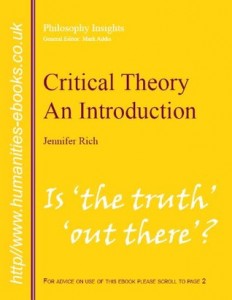 Title: Critical Theory: An Introduction (Goodreads)
Title: Critical Theory: An Introduction (Goodreads) Author: Jennifer Rich
Published: Humanities-Ebooks, 2010
Pages: 97
Genres: Non-Fiction
My Copy: eBook
For me Critical Theory: An Introduction by Jennifer Rich was everything I wanted Literary Theory: A Very Short Introduction by Jonathan Culler to be. It had a logical format and it went through a few different literary movements and talked about the key people and theories involved with each school of thoughts. But then it got me wondering; what is the different between Critical Theory and Literary Theory? There seems to be no real difference and I’m not entirely sure why they would use two different names to talk about the exact same thing. I might be ignorant and not fully understanding the differences but if there is a difference please let me know in the comments below.
The book starts off with Russian Formalism, a topic I spent a bit of time exploring before continuing the rest of the book. The idea of formalism is something that I feel may be a good foundation for any literary student. To be able to understand genres, tropes, metering, grammar and syntax can provide you with some questions to ask every piece of literature. Asking why a piece of text is written in one perspective and not another and what the focalisation is focusing on can help develop some useful skills. Some people are saying that formalism is making a comeback and I tend to agree, I recently completed a university subject that went though the basics of this school of thought (even if there was no mention of formalism). If you understand these basic concepts, I think you develop a decent tool base for critical reading and future studies of literary theories.
Critical Theory: An Introduction also looked at Structuralism, Semiotics, Post-Structuralism, Deconstruction, Psychoanalytic and Postcolonial Theory. I have a feeling my interest will psychoanalysis and Marxism and this book seemed to verify this very thought, even if it only went into Marxism in passing. The major problem I found is that Psychoanalytic Theory is going to be a huge undertaking, more so than most of the others. I feel that I will need to develop, not only an understanding in psychology, but also a bit of a focus into semiotics as well. I am not too bothered by this thought; this is more of a blinding realisation of how much work is ahead of me.
While Critical Theory: An Introduction may have taken a more textbook type approach to literary theory than Literary Theory: A Very Short Introduction, I think the format is better suited if I ever need to refer back to the book. Literary Theory: A Very Short Introduction was a little all over the place and it works well for reading the book from cover to cover but if I need to look up what the book says on a topic it won’t be easy. I prefer to have chapters dedicated to one literary theory; makes things easier when I refer back to this book in the future.
I’m really enjoying exploring the world of literary theory and I’m beginning to understand the different types of theories on a very fundamental level. The only downside to this is the realisation that there is so much more to learn. I have to remind myself that I’m not going to be able to become an expert in all these fields and I need to focus. I’ve chosen my preferred fields but I will continue to learn the basics of all literary theories and see if something else pops out. I’m still shopping around, while psychoanalysis and Marxism seem like the right fit for me, I’m open to the possibility of finding something better (and maybe easier). Also, learning the basics in literary theory will have the added bonus of been able to see a book from different schools of thought. If you are looking for a good, quick introduction to literary theories, Critical Theory: An Introduction by Jennifer Rich is a good pick, it is short and only covers a few theories but will give you a decent understanding of them.

 Genres are always tricky and there are often a lot of problems with assigning a genre. Recently River City Reading (a fantastic blog if you are not following it) was asking about historical fiction which was interesting but I have been thinking about something different. I am curious to know how people choose if a book is contemporary fiction or literary fiction. Most people may agree that literary fiction covers a wide range of different genres but when it comes to contemporary fiction there is a very fine line between the two.
Genres are always tricky and there are often a lot of problems with assigning a genre. Recently River City Reading (a fantastic blog if you are not following it) was asking about historical fiction which was interesting but I have been thinking about something different. I am curious to know how people choose if a book is contemporary fiction or literary fiction. Most people may agree that literary fiction covers a wide range of different genres but when it comes to contemporary fiction there is a very fine line between the two. The Literary Exploration reading challenge is back, by popular demand. As most people know,
The Literary Exploration reading challenge is back, by popular demand. As most people know,  As the year starts to come to a close, we readers start to think about what we would like to read next year and for some of us, we look for the reading challenge that excites us the most. As most people know,
As the year starts to come to a close, we readers start to think about what we would like to read next year and for some of us, we look for the reading challenge that excites us the most. As most people know,